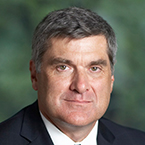
A distinguished leader in cancer research, Dr. Thompson has greatly contributed to the overall understanding of cellular metabolism, signaling, survival, immune homeostasis, and carcinogenesis. He was the first to demonstrate that CD28, a co-stimulatory cell surface protein expressed on T-cells, is capable of regulating cytokine production and lymphocyte survival. Conversely, he discovered that the T-cell receptor, cytotoxic T-lymphocyte-associated protein 4 (CTLA-4), functions by negatively regulating CD28 activation. These observations have contributed to clinical investigations involving immunotherapeutic targeting of CD28 and CTLA-4 that have resulted in FDA approval of the CTLA-4 monoclonal antibody, ipilimumab, for treatment of melanoma.
Dr. Thompson determined that CD28 is capable of promoting the expansion of T-cell populations by inhibiting apoptosis. This finding resulted in his establishment of an in vitro T-cell expansion technique and the cloning of the anti-apoptotic genes, bcl-x and XIAP, as well as other regulatory members of the Bcl-2 family of oncogenes. His studies involving this family of proteins have led him to determine that these proteins are capable of operating, in part, by regulating mitochondrial function. More specifically, he has demonstrated that some Bcl-2 family proteins facilitate the ability of cancer cells to overcome normal growth factor signaling dependency in order to sustain ATP synthesis during carcinogenesis.
By focusing on understanding the fundamental mechanisms governing cell survival and death, Dr. Thompson has defined various signaling pathways that link nutrient uptake and metabolism to cell proliferation and carcinogenesis. These discoveries have been translated into multiple research efforts aimed at utilizing these findings to better treat autoimmune diseases and cancer.
Career Highlights
2014 Drexel Prize in Cancer Biology
2012 Massachusetts General Hospital Award in Cancer Research
2011 American College of Physicians Award for Outstanding Work in Science as Related to Medicine
2009-2012 Board of Directors, AACR
2007 Simon M. Shubitz Cancer Prize and Lectureship
2005 Elected Member, National Academy of Sciences, Washington, D.C.
2003 Stanley J. Korsmeyer Award, American Society for Clinical Investigation
2002 Elected Member, Institute of Medicine
2001-2003 Chairman, Board of Scientific Counselors, National Cancer Institute
1999-2014 Member, Albert Lasker Medical Research Awards Jury
1999 Elected Member, American Academy of Arts and Sciences
1992 Elected Member, American Association of Physicians
1989 Elected Member, American Society for Clinical Investigation
1977 MD, University of Pennsylvania School of Medicine